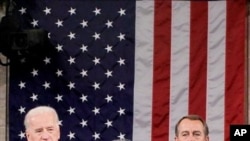Political analysts say President Barack Obama continued his move to the political center Tuesday with his State of the Union Address to Congress. But experts say the prospects for bipartisanship and cooperation between the president and opposition Republicans remain uncertain.
The annual State of the Union speech is always a combination of policy priorities and political theatre. And this year’s speech had a twist with many lawmakers from both parties sitting together as a sign of solidarity in the wake of the recent shooting tragedy in Arizona in which six people were killed and several others wounded including Congresswoman Gabrielle Giffords.
The national political climate seems to have cooled a bit since the Giffords shooting, and President Obama used the moment to make a fresh appeal for unity and cooperation.
“We will move forward together or not at all, for the challenges we face are bigger than party and bigger than politics," said President Obama.
New political reality in Washington
Mr. Obama is dealing with a new political reality in Washington that includes Republican control of the House of Representatives and a diminished Democratic majority in the Senate.
The singular Republican focus since last November’s election has been undoing the president’s health care law and shrinking the size of the federal government.
Wisconsin Congressman Paul Ryan delivered the official Republican response to the president’s speech.
“We are at a moment where if government’s growth is left unchecked and unchallenged, America’s best century will be considered our past century," said Congressman Ryan.
Tensions between Republicans and Tea Party
But in another odd twist, there was a second response from Republican Congresswoman Michele Bachmann of Minnesota, who spoke on behalf of Tea Party groups around the country.
“Because of you, Congress is responding and we are just beginning to start to undo the damage that has been done in the last few years," said Congresswoman Bachmann.
The Tea Party movement played a critical role in mobilizing voters in the November midterm election that led to Republican gains in Congress. But tensions between Tea Party supporters and Republican congressional leaders could emerge down the line if Congress fails to enact the deep budget cuts that Tea Party supporters are demanding.
Political moderates saw signs of hope in the president’s State of the Union speech. Republican political strategist Mark McKinnon is co-founder of a centrist group called No Labels that promotes bipartisan cooperation:
“We think that there is a real thaw in the political climate in Washington and we think that thaw will lead to greater discussion and ultimately solutions to the problems we are facing," said McKinnon.
McKinnon says political independents around the country seem to be backing President Obama again, in part because of bipartisan successes at the end of the last Congress and in part because of the restrained political mood in the wake of the shooting tragedy in Tucson, Arizona.
“There is no question that he is being rewarded for moving to the [political] middle," he said. "He has moved to the center much more quickly than [former President] Bill Clinton did at this time in his presidency. It took Bill Clinton about six months to a year to pivot to the center and President Obama has done it in just a matter of a couple of months after the midterm elections.”
President Bill Clinton faced a similar political challenge when Democrats lost control of Congress to Republicans in 1994. After a period of confrontation that included two government shutdowns, Mr. Clinton and congressional Republicans were able to find common ground on issues like trade and welfare reform.
Other analysts believe the tempered political rhetoric will be a short-term phenomenon.
John Fortier with the American Enterprise Institute expects both political parties to increasingly focus on the 2012 presidential election in the months to come.
“Some smaller opportunities for the two parties to work together, but also looking ahead to that election where we know things are going to pick up in terms of the politics of things, where things will be harder to get done, and the two parties will be looking to have great contrasts for that 2012 election," said Fortier.
Mr. Obama was at a low point in the polls shortly after last year’s midterm victories by Republicans. But experts note how fast his poll numbers have rebounded in recent weeks, a lesson to both parties that in U.S. politics, change is often just around the corner.





